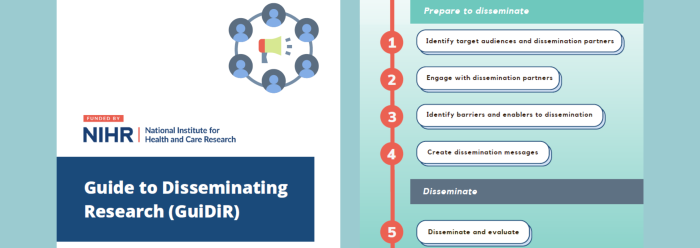Researchers from the ARC East of England, in collaboration with public advisors, have launched an innovative framework designed to support researchers, funders and practitioners to develop, implement, and evaluate effective dissemination strategies.

The Guide to Disseminating Research (GuiDiR) framework
The Guide to Disseminating Research (GuiDiR) framework, developed by Professor Debi Bhattacharya, outlines a series of steps for effectively communicating research findings to the right audiences throughout the duration of a project. It provides researchers, funders and practitioners with a detailed list of activities designed to support planning, conducting, and evaluating an effective dissemination strategy for a research project.
The launch of this framework comes at a significant time, as it is estimated that less than one third of research evidence is translated into policy or practice. The evidence-based GuiDir framework aims to close this gap by supporting researchers to integrate robust dissemination strategies from the outset of their project.
“Academic journals and conferences are ineffective at reaching all audiences. GuiDiR ensures that researchers consider how to enable their findings to reach the right people. This includes the ‘end users’ who could make use of the research e.g. clinicians and patients; those who could be impacted by the research such as employers and those who influence the use of the research e.g. policymakers."
Professor Debi Bhattacharya, Lead of the GuiDiR Framework
Funded by the NIHR, the research team collaborated with behavioural scientists, patient and public representatives, health psychologists, and a social scientist to develop the framework. GuiDiR comprises five key steps: identifying and engaging target audiences, addressing barriers and facilitating dissemination, developing relevant messages, implementing dissemination strategies, and evaluating impact. The resource has an accompanying video to help researchers apply the framework to their work.
Professor Debi Bhattacharya explains the background to the development of this framework:
“I felt lost when developing an evidence-based dissemination strategy for a study. I was overwhelmed by the array of knowledge translation models whilst finding that none provided sufficient detail to guide me through the process of dissemination.
Professor Debi Bhattacharya, Lead of the GuiDiR Framework
"GuiDiR has been designed to draw together the information using accessible language including the necessary detail to undertake the required activities of a dissemination strategy.”
Professor Debi Bhattacharya, Lead of the GuiDiR Framework
During the development of GuiDiR, researchers identified that existing knowledge mobilisation frameworks often lacked practical guidance. While many frameworks highlighted what actions to take, such as 'prepare tailored messages', there was limited guidance on how this might be achieved. GuiDiR consolidates key insights from current frameworks, offering a clear, actionable guide for research dissemination.
David Taylor, Patient and Public representative, explains the importance of dissemination for patients:
"Dissemination is key to changing policy, behaviours and practice in order to achieve real outcomes for patient benefit. Without effective dissemination, research has limited or no impact. Effective dissemination is a cost-effective way to get more out of any research programme, and the GuiDiR framework provides guidance to help researchers achieve this.
David Taylor, Patient and Public representative for the GuiDiR Framework
"Public co-applicants can contribute enormously when it comes to developing dissemination strategies, for example, by helping with stakeholder communications and framing messages, ensuring that content is accessible and appropriately communicated to the target audiences."
David Taylor, Patient and Public representative for the GuiDiR Framework
To celebrate the launch of the new framework, the project team hosted an event attended by around 85 individuals, including researchers, funders, and healthcare professionals. The event included a panel discussion with dissemination experts, researchers and members of the public, all of whom played a key role in the development of GuiDiR. You can watch the full launch event here.
If you have any questions about the framework, contact the project team here charmer.study@leceister.ac.uk.
Access the GuiDiR framework here
The GuiDiR framework is part of the CHARMER (Comprehensive Geriatrician-led Medication Review) study. This is a five-year England-wide research programme funded by the NIHR to support hospital doctors and pharmacists to deprescribe unnecessary medicines for older people in hospital. Learn more about the CHARMER study:
